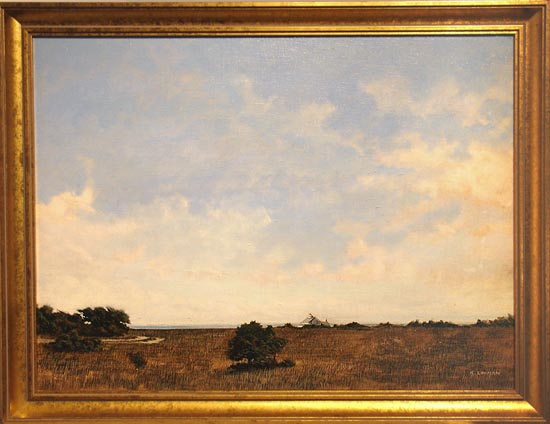
|
|
Kenneth Layman Nantucket Landscape Oil on Canvas 1987 signed by the artist
Professionally framed in gold-tone wooden frame with simple linear profile.
image area approx 24" wide x 18" high
framed size approx 27" wide x 21" high
SOLD |
Nantucket Landscape portrays a classic scene of grasslands and low trees on the island of Nantucket, with a seaside home in the distance. The Atlantic is visible on the horizon, and the sky is scattered with billowing clouds.
Detail |
|
A resident of Nantucket Island, Kenneth Layman studied at Rhode Island School of Design, earned his MA at Tulane University, and was chairman of the art department at Wheflock College, Boston. His masterfuly executed oil paintings demonstrate his familiarity with and love of the natural and unspoiled aspects of the sea, the sky, and the shore regions of the eastern coastal area. On viewing the works, one is surprised to learn that Mr. Layman does not paint directly on location, but rather from a collectiive visual and philosophical memory. He is looking for a "feeling" which sometime takes the form of an accurate and realistic identifiable site and at other times simply expresses the essence of the coastal environment. Mr. Layman's work may be seen at the US Department of State and hang in the American Embassy in Athens, Greece; Sao Paulo, Brazil; Geneva, Switzerland, and New York City. His work is also in numerous private collections including those of Saul Bellow, John Chancellor, Nelson Doubleday, and Peter Benchley. |
|
|
Historical Note: "The early inhabitants of Nantucket were Native Americans. In 1659, a group of nine Massachusetts Englishmen purchased the island for 30 pounds and two beaver hats. Their purpose was to raise sheep as well as to find refuge from the religiously intolerant Puritans. In 1672, looking for an additional source of revenue, the islanders recruited whaling men to settle on the island and teach islanders how to capture whales and obtain the oil. The hunting of sperm whales was very profitable. Thus began the era of Nantucket whaling and economic boom for the island. Although the great fleet of whaling vessels was almost destroyed during the Revolutionary War and again during the War of 1812, Nantucket rebounded from adversity. From 1800-1840 Nantucket was the "Whaling Capital of the World" and was the third largest city in Massachusetts. By the time of the Civil War, the whaling industry was in serious decline. Not only had the whales been overhunted. After 1850, as the whaling economy declined, the population decreased rapidly and Nantucket was once again isolated. This isolation preserved the charm and beauty of Nantucket and tourists eventually discovered "The Far Away Island." Nantucket has more buildings listed in the National Register of Historic Places than any other place in Massachusetts and more than 800 houses still standing that were built before the Civil War." |
|
![]()
![]()
All pages on this web site are copyright 1998 to 2016 by Williams Gallery West